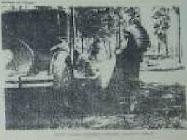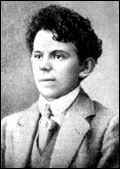I like the historical acuity of Michael Scharf's critique of "personalism" in American poetry, despite the fact that my perspective is about as opposite to his as one can get. I do think he has identified something deeply askew in the approach or method which turns poetry into a celebration of subjectivity without limits, as a kind of aesthetic compensation for all the limitations of actual & historical reality.
But I fork paths with Scharf when he offers a form of Marxist-historical-materialist critique as a response to the problem of the person & the personal. A hortatory & quasi-religious rhetoric insinuates itself into his analysis. We are under a moral obligation to "figure a disposition" between "possession and dispossession" - a "material site" of "mistranslation" and "struggle" - ie. it appears that Scharf's notion of the person is that of something partially determined or impinged upon by a materialist history of social struggle, and poetry, in order to mean anything, has to seek the constantly-shifting nexus or interface or locus of this set of implied obligations to the larger (& conflicted) situation.
I have no problem with the idea that individual human meaning is only discovered within a context of the shapes of time & history of the human race as a species, and the world as a whole. What I would argue is that such meaning can be explored & discovered without denying the individual human person an essential - the essential, paradigmatic role - both in history in general, and in poetry in particular.
The crux of the matter comes with an analysis of this notion of the individual human person. If we limit the concept of the person to the egocentric Self as sketched by Scharf (as part of the "mainstream" ideology of American poetics), then Scharf's critique & dismissal of such a limited concept is easy to understand. But we need, rather, to qualify & complicate our sense of the person, rather than reject a caricature of same. One could consult, just for one example, Christian Moev's The Metaphysics of Dante's Comedy, for an introduction to Dante's medieval-poetic understanding of the human self as essentially contingent : but not, as in the modern sense, contingent upon abstract or human-historical forces, but upon a relationship with a divine source in whose image man is made. The relational complexities of the (Judeo-Christian) religious vision of Man-&-God - within which the category of the "personal" is not denied, but rather supplemented & enhanced, while at the same time subjected to an ultimate ethical demand ("eternal judgement" on each individual soul) - these complex relations are part of a nexus of understanding, a viewpoint within which materialist historicism seems finally like a form of personal irresponsibility masking itself as social ethics.
I have gone into these issues at greater length in various blog posts here on Russian Acmeism & "domestic hellenism" : on the perspective emanating from Gumilev & Mandelstam (with deep roots in Byzantine Christianity) which asserted - in the face of revolutionary collectivism - a "chaste" vision of the dignity & beauty of both individual persons & distinct natural phenomena of all sorts. The early 20th-cent. debate between Acmeism & Futurism was another arena in which these basic philosophical problems polarized & played themselves out on an aesthetic/poetic plane.
12.23.2010
Subscribe to:
Post Comments (Atom)



1 comment:
"The individual is always mistaken" wrote Emerson in "Experience." Emerson? Champion of the individual?? But, as Doug Crase points out, if the individual were not always mistaken, there would be no need for more of us.
Transcendentalism tells us that the individual is one and all, is a (vitally important) strand of the whole cloth.
Post a Comment